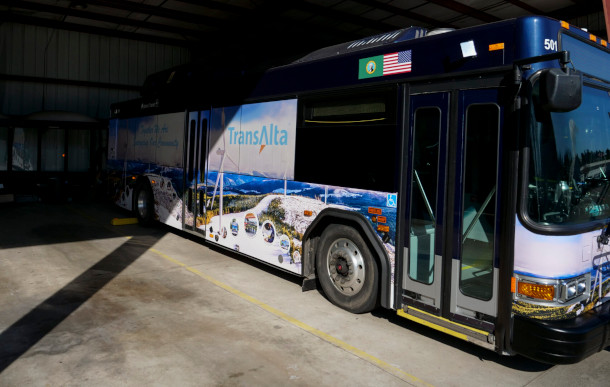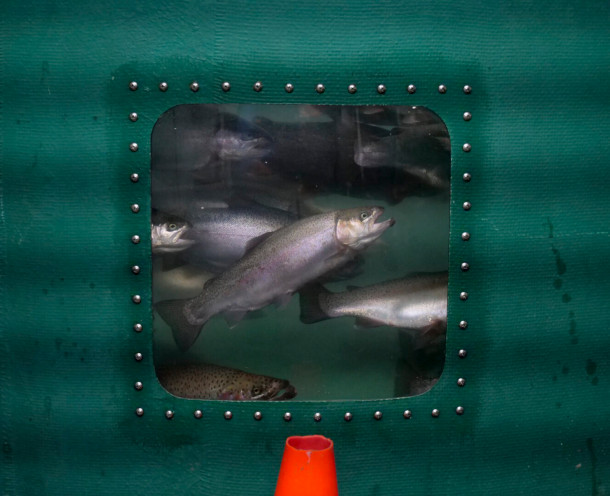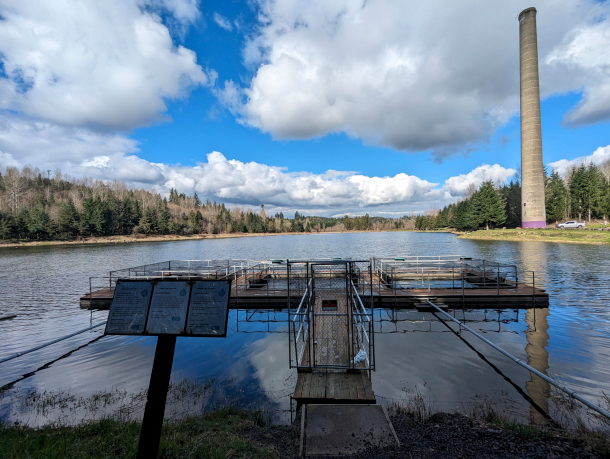Coal Transition Bank
Air Date: Week of May 3, 2024

This Lewis County Transit electric bus was purchased with grant funds from TransAlta. (Photo: Jeremy Long, WITF)
The only coal-fired power plant in Washington state is in the process of shutting down, taking hundreds of jobs with it. But a $55 million fund set up by the coal plant is helping revitalize the small town with community development projects and more. Rachel McDevitt of WITF and StateImpact Pennsylvania reports.
Transcript
CURWOOD: Not every community can replace the jobs lost when a coal fire power plant shuts down, but Centralia, Washington has found a way to try. 13 years ago its coal burning utility agreed to close by 2025 and give $55 million to help the community make the transition. Those funds now support new energy technology, community and economic development and energy efficiency. Rachel McDevitt of radio station WITF in Harrisburg, Pennsylvania went west to report on the progress so far of some of the funded projects.
CLARK: So this bus is charging, and that's a fan that keeps the batteries cool and the charging equipment cool.
McDEVITT: Joe Clark heads up Lewis County Transit, which serves the Centralia area. He's showing off the electric charging station made possible with a grant from the Coal Transition Fund, the $55 million put up by power plant owner TransAlta to help the area deal with the loss of the plant next year. Clark's not stopping at electric buses. He jumps in his car and drives to a vacant lot in an industrial park about 15 minutes outside town.
CLARK: Really cool green field, you probably wonder why I stopped here. This is where our hydrogen facility's going.
McDEVITT: He hopes this is the future of transit. Clark just accepted delivery of the first hydrogen-fueled buses in Washington. The state is trying to develop a federal hydrogen hub powered by renewable energy. TransAlta gave the transit company nearly $2 million to build an electrolyzer right here, part of the new energy technologies fund that will use electricity to split water molecules into oxygen and hydrogen.
CLARK: For longer range in rural America or rural Washington where we are today, we have to use hydrogen, because the battery electric just won't get us there.
McDEVITT: The company has ordered equipment to build a fueling station where US 12 meets Interstate 5. This point about halfway between Seattle and Portland could be a convenient place for trucks to refuel. Clark sees a hydrogen buildout as a way to attract companies that want to use hydrogen and create cool new opportunities for people here. He says this area suffers from brain drain. Kids who head off to college often don't come back because the kinds of jobs they want aren't here.
CLARK: And we're really hoping that this effort will bring a series of jobs that are not only interesting and engaging and attractive, but are well paying.
McDEVITT: A new clean energy economy that might bring direct job replacements for workers at the closing coal plant is only one piece of the transition fund. A chunk devoted to community development has gone to educational programs. Some focus on science, math and engineering to prepare kids for future jobs or college. Others prepare students to handle challenges in different ways.

The Onalaska High School hatchery program boasts a tank full of rainbow trout. (Photo: Jeremy Long, WITF)
HOFFMAN: Right here we have some rainbow trout.
McDEVITT: About half an hour from Centralia at Onalaska High School, Kevin Hoffman teaches career and technical education courses like woodshop, metalwork, and aquaculture. Hoffman applied for and got two TransAlta grants to raise the school's fish hatchery program to one that rivals commercial operations. When he started, the program was raising about 1,000 pounds of fish.
HOFFMAN: Now we can almost raise about six to 7,000 pounds of fish.
McDEVITT: Students do everything from feeding fish to constructing the new hatchery, a 24-by-70-foot low metal building. Hoffman says some students sign up for this class looking for an easy science credit, but they end up doing more math than they bargained for.
HOFFMAN: We're able to calculate it out and say hey, we want the top largest 300 fish, and now we know that okay, those are all the fish over, say, 34 centimeters we need to keep and pull out.
McDEVITT: Down at Carlisle Lake where adult fish are released, Hoffman says he's trying to teach the kids to ask, how can we make this better?
HOFFMAN: How diligent do you have to be with your your daily feeding, your daily water quality checks, your disease management, all of that stuff. So just trying to teach the students to think outside the box, being efficient, coming up with new ideas, problem solving.
McDEVITT: Every year, the students release up to 10,000 trout that can be caught and taken home. About 600 are between six and eight pounds, making for an exciting opening day of fishing season.

After the fish are raised at the Onalaska High School hatchery, they are transferred to the Carlisle Lake nets. (Photo: Jeremy Long, WITF)
HOFFMAN: And it's a zoo. We've had people come from Seattle, Portland, Wenatchee, which is the other side of the mountains, like four- or five-hour drive.
McDEVITT: It's important to Hoffman that the program gives back to the community like this. It's a similar story for Levi Althauser in downtown Centralia.
ALTHAUSER: I think that if you don't know the people you live next to, then you're not really living a full life.
McDEVITT: Levi and his wife Sarah started the Juice Box Public House because they wanted a new family-friendly social space, like the rural granges that their grandparents went to.
ALTHAUSER: Like all the dances they used to go to, all the activities they used to do that they'd stay up ’til 2 am, have a midnight dinner and then go back to dancing for another two hours with kids.
McDEVITT: The Althausers bought the building, an old Elks Club, in 2019. There's a bar in the front with plush chairs and a few high-top tables. Local artwork hangs on the walls. The back room has a big stage. Decorative blown glass is suspended from high ceilings. A huge elk head named Arthur hangs above the entrance. It's a cozy blend of modern and rustic with long cafeteria-style tables.
ALTHAUSER: And so if you're a couple, a lot of times you sit at one end, and you can tell, like people feel a little bit awkward, like, “I don't know if I should sit too close to you,” but that's what we're trying to do, is get people to sit with strangers that will then next time not be strangers anymore.
McDEVITT: It would have been a short-lived venture without a weatherization grant from the transition fund.
ALTHAUSER: So anywhere where you see a brown spot, which is pretty much everywhere, is where another leak started. And so we were going crazy trying to cover leaks. We--we covered the whole roof in plastic and still had all of the leaks coming through.
McDEVITT: They replaced the roof and failing heating system. The money came from the weatherization pot, even though the outcome benefits community and economic development. Althauser says it was a huge help as he entered into the notoriously profitable business of a music venue.
ALTHAUSER: It's not a wise financial investment, but it's a good community investment.
McDEVITT: The Althausers hope that Juice Box is part of what makes Centralia a good and fun place to live and gets more people and businesses to call it home. TransAlta has been a big community partner, donating to the community college, the United Way, and other nonprofits. It helps support a middle class that could come together to support the community. Even as that company shuts down, the fund it made is helping Centralia forge ahead on its own. For Living on Earth, I'm Rachel McDevitt.
CURWOOD: Rachel’s story comes to us courtesy of WITF and State Impact Pennsylvania.
Links
Living on Earth wants to hear from you!
Living on Earth
62 Calef Highway, Suite 212
Lee, NH 03861
Telephone: 617-287-4121
E-mail: comments@loe.org
Newsletter [Click here]
Donate to Living on Earth!
Living on Earth is an independent media program and relies entirely on contributions from listeners and institutions supporting public service. Please donate now to preserve an independent environmental voice.
NewsletterLiving on Earth offers a weekly delivery of the show's rundown to your mailbox. Sign up for our newsletter today!
 Sailors For The Sea: Be the change you want to sea.
Sailors For The Sea: Be the change you want to sea.
 The Grantham Foundation for the Protection of the Environment: Committed to protecting and improving the health of the global environment.
The Grantham Foundation for the Protection of the Environment: Committed to protecting and improving the health of the global environment.
 Contribute to Living on Earth and receive, as our gift to you, an archival print of one of Mark Seth Lender's extraordinary wildlife photographs. Follow the link to see Mark's current collection of photographs.
Contribute to Living on Earth and receive, as our gift to you, an archival print of one of Mark Seth Lender's extraordinary wildlife photographs. Follow the link to see Mark's current collection of photographs.
 Buy a signed copy of Mark Seth Lender's book Smeagull the Seagull & support Living on Earth
Buy a signed copy of Mark Seth Lender's book Smeagull the Seagull & support Living on Earth

